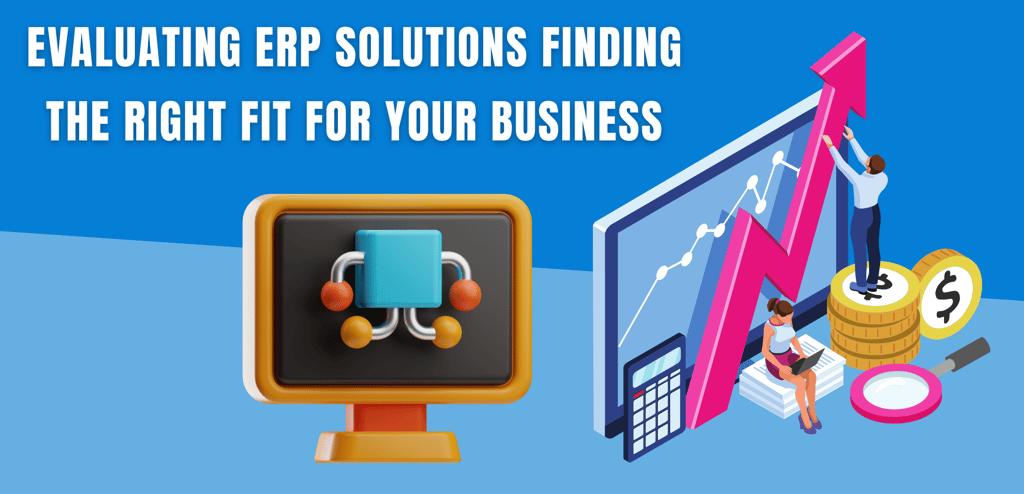
Evaluating ERP Solutions Finding the Right Fit for Your Business
By AZ Konnect Team
6/5/20243 min read


Enterprise Resource Planning (ERP) systems are essential tools for businesses looking to streamline their operations, improve efficiency, and gain a competitive edge. However, choosing the right ERP solution can be a daunting task given the myriad of options available. In this blog post, we'll guide you through the key factors to consider when evaluating ERP solutions to ensure you find the perfect fit for your business.
Understanding ERP Solutions
ERP solutions integrate various business processes into a single unified system, enabling real-time data flow across departments such as finance, human resources, supply chain, and customer relationship management. This integration facilitates better decision-making, enhanced productivity, and improved overall performance.
Key Factors to Consider When Evaluating ERP Solutions
1. Business Requirements and Goals
Before evaluating ERP solutions, clearly define your business requirements and goals. Identify the specific processes and functions that need improvement and determine the objectives you aim to achieve with an ERP system. This will help you focus on solutions that align with your business needs.
2. Scalability and Flexibility
Choose an ERP solution that can scale with your business as it grows. The system should be flexible enough to accommodate changes in business processes and adapt to evolving industry standards. Scalability ensures that the ERP solution remains relevant and effective as your business expands.
3. Integration Capabilities
An effective ERP system should seamlessly integrate with your existing software and third-party applications. Check for compatibility with your current systems, such as CRM, accounting software, and e-commerce platforms. Integration capabilities are crucial for maintaining a unified and efficient workflow across the organization.
4. User-Friendliness and Training
The ERP solution should have an intuitive user interface that is easy to navigate. A user-friendly system reduces the learning curve and enhances user adoption. Additionally, ensure that the vendor provides comprehensive training and support to help your team get up to speed quickly.
5. Customization Options
Every business has unique processes and requirements. Look for an ERP solution that offers customization options to tailor the system to your specific needs. Customizable features allow you to create workflows, reports, and dashboards that align with your business operations.
6. Vendor Reputation and Support
Evaluate the reputation of the ERP vendor by researching customer reviews, case studies, and industry reports. A reputable vendor with a proven track record is more likely to deliver a reliable and effective solution. Additionally, assess the quality of customer support and ensure that the vendor offers ongoing maintenance and updates.
7. Total Cost of Ownership
Consider the total cost of ownership (TCO) when evaluating ERP solutions. TCO includes not only the initial implementation cost but also ongoing expenses such as licensing fees, maintenance, training, and support. Compare the costs against the potential benefits and ROI to determine the value of the investment.
8. Security and Compliance
Data security is paramount when selecting an ERP system. Ensure that the solution complies with industry-specific regulations and standards. Look for features such as data encryption, user access controls, and regular security updates to protect sensitive information.
9. Mobile Access and Remote Capabilities
In today’s digital age, having mobile access and remote capabilities is essential. An ERP solution with mobile functionality allows your team to access critical information and perform tasks from anywhere, enhancing flexibility and productivity.
10. Future-Proofing
Technology is constantly evolving, so it's important to choose an ERP solution that is future-proof. This means the system should be built on a modern architecture that supports ongoing innovations and technological advancements. Ensure the vendor is committed to regular updates and enhancements to keep the system current.
Conclusion
Evaluating ERP solutions requires a thorough understanding of your business needs, goals, and the key features that will drive efficiency and growth. By considering factors such as scalability, integration capabilities, user-friendliness, customization, vendor reputation, cost, security, mobile access, and future-proofing, you can make an informed decision that aligns with your business strategy. Choosing the right ERP solution is a significant investment, but with careful evaluation, it can lead to substantial improvements in productivity, profitability, and competitive advantage for your business.
Subscribe To Our Newsletter


